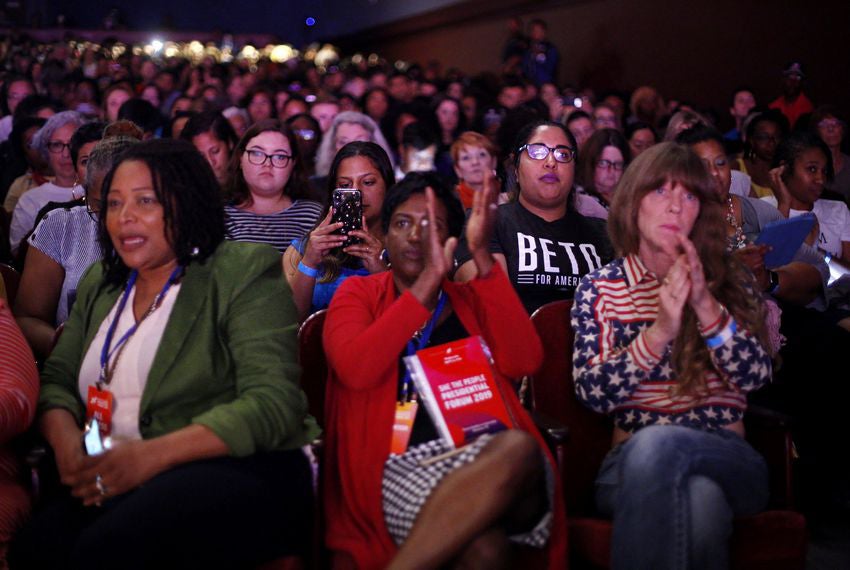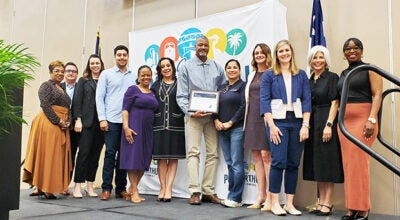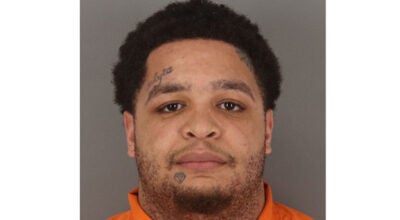Democratic 2020 candidates pitch platforms to women of color, black mayors in Houston
Published 4:01 pm Thursday, April 25, 2019

- The audience listens at the She the People Presidential Forum at Texas Southern University in Houston. Eight Democratic presidential candidates attended to answer questions Wednesday. (Michael Stravato for The Texas Tribune)
The Texas Tribune
texastribune.org
HOUSTON — Texas’ biggest city was at the center of the 2020 presidential race Wednesday as a group of Democratic candidates descended here to appeal to a key voting bloc in the primary.
Appearing at Texas Southern University, a historically black college, eight candidates made their pitches at a forum hosted by She the People, a national network of women of color. The three-hour event was one of the biggest gatherings yet of the Democratic primary candidates in the country, let alone in Texas.
Taking questions from moderators and the audience, the candidates covered a range of issues that have already animated the primary — health care, criminal justice and voting rights — while sharpening their cases for how those issues impact women of color. The massive 2020 field is historically diverse, and most participants faced the same question at the end of their time onstage: Why should women of color choose you?
One of the candidates from Texas, Julián Castro, sought to make a personal connection.
“I am only here because of two very strong women,” the former U.S. housing secretary and San Antonio mayor said in reference to his Mexican immigrant grandmother and his civil rights activist mother. “I grew up seeing both the struggles and the promise of two strong women of color, and I have dedicated my time in public service to making sure that people just like my mother and grandmother can do better in this country.”
For some candidates — particularly those who are neither women nor people of color — the forum at times appeared to be a humbling experience. The other hopeful from Texas, Beto O’Rourke, paused before answering why women of color should back him, acknowledging that their support is “not something that I’m owed, not something that I expect” but “something that I fully hope to earn by the work that I do on the campaign trail.” He cited a number of prominent black women in politics that he has learned from — including Houston U.S. Rep. Sheila Jackson Lee, a fellow Democrat who has a bill to study reparations that O’Rourke and several other candidates support.
Other candidates felt some heat as the moderators and the audience sought to keep them focused on the people who had come to listen. Asked how he’d win over women of color who voted for Hillary Clinton in 2016, U.S. Sen. Bernie Sanders, I-Vt., initially responded by making a broad promise to unify the party no matter who the nominee is. Some in the crowd did not sound satisfied with the answer. A moderator pressed him to speak specifically about women of color, who he then said are an “integral part” of his campaign and would be just as important in his administration.
Rounding out the lineup was U.S. Sen. Elizabeth Warren of Massachusetts, who got one of the most enthusiastic receptions of the afternoon as she interacted with fans in the crowd and repeatedly promised, “I have a plan.” One of those plans was making medical providers create a pay structure that incentivizes them to bring down the disproportionately high rate of women of color who die during childbirth.
“Talk to the hospitals who are delivering these babies in a language they understand — the language of money,” Warren told reporters afterward.
Among the Warren fans at the event was Lynda Cartwright, a retired Houston educator who said she was struck by the senator’s “humanitarian perspective for all Americans” on economic issues. While Warren was her favorite, Cartwright said she was pleased to see other candidates make sincere efforts to connect with women of color.
“I think they’re realizing the strength that they can get from people of color — the voting,” said Cartwright, a Texas Southern alumna. “They need to be candid, they need to be transparent in how they’re going to address people of color’s concerns.”
On the sidelines of the forum, candidates confronted an issue that has flared up in the primary in recent days: whether the incarcerated should be able to vote. Sanders recently said they should, prompting a debate in the party about how far voting rights should be extended to those in prison. After he spoke at the forum, U.S. Sen. Cory Booker of New Jersey told reporters he was frustrated that the issue had become another “political box-checking exercise” in the primary and wants instead to focus on halting a system of mass incarceration so that people don’t needlessly end up behind bars in the first place.
Both Castro and O’Rourke fielded the question from reporters, similarly responding by expressing support for restoring the right to vote for nonviolent offenders.
“For violent criminals, it’s much harder for me to reach that conclusion,” O’Rourke said. “I feel like at that point you have broken a bond and a compact with your fellow Americans, and there has to be a consequence in civil life to that as well.”
After they spoke at the forum, five of the candidates were slated to head downtown to address the yearly meeting of the African American Mayors Association. Those candidates were U.S. Sens. Amy Klobuchar and Kamala Harris, Booker, Castro and Sanders.
Addressing the meeting Wednesday evening, Harris put an emphasis on criminal justice, drawing on her experience as California attorney general while criticizing the Trump administration’s limiting of consent decrees, or legal agreements between the Justice Department and local police departments in need of reform.
“The partnership potential between a president of the United States who has held local office, who has held state office and who knows the connections and the relationships can be absolutely beneficial in a way that we have not seen in a long time,” Harris said. “But we need new leadership to maximize those relationships.”
Of the eight contenders the She the People forum drew to the state, one of them, Sanders, was using the occasion to make a broader swing through Texas, with campaign rallies planned after the forum in Houston and Thursday in Fort Worth.
Sanders didn’t shy away from Texas’ red-state status at the Houston rally, drawing boos as he acknowledged that Trump carried the state in 2016. But he made the case that then-candidate Trump had misled voters in places like Texas, rattling off a list of issues where his campaign rhetoric hasn’t matched what he’s done in office.
“When Trump told the people of Texas he would provide health care to all people,” Sanders said, “he lied.”
Sanders also used the rally to double down on his support for letting incarcerated people vote, acknowledging his recent comments had made a stir. But he said, “Being an American citizen and having the right to vote is something that we must never, ever give up on.”
Wednesday marked Sanders’ first trip to Texas since launching his 2020 bid in mid-February. For several other contenders who were in Houston on Thursday, it was their second trip to the state this year after previously visiting for their own events, fundraising or the South by Southwest festival in mid-March.
Regardless, the day was a boon for Texas Democrats who increasingly view the state as a battleground. As he left the forum, state party Chairman Gilberto Hinojosa said the event — with its number of candidates and early timing in the primary — was unlike anything he has seen in his 35 years in Texas Democratic politics.
“One of the things that came out of this event today is a recognition — [one] that people who have been involved in politics have known about for a long time — that women of color deliver [a] large number of votes for the Democratic candidates in every election cycle,” Hinojosa said. “That number’s increasing significantly over the years. In the last election cycle, they delivered big time for Democratic candidates. They’re more energized, engaged and angry today than they’ve ever been before.”
Abby Livingston contributed to this report.
The Texas Tribune is a nonpartisan, nonprofit media organization that informs Texans — and engages with them – about public policy, politics, government and statewide issues.





